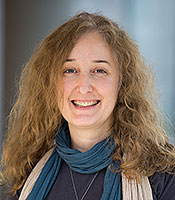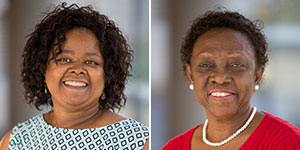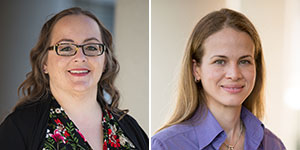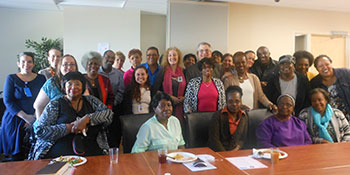

In Good Company
B.O.L.D. “Buddy Program” Expands to Include Breast Screening Companions
The Bronx Oncology Living Daily (B.O.L.D.) Program, offered through the Albert Einstein Cancer Center and Montefiore Einstein Center for Cancer Care, aims to provide psychosocial services to enhance the physical, emotional and spiritual health and well-being of people with cancer. A particularly special component of the program is its B.O.L.D. Buddy Peer Navigation Program, which was established in 2011 and matches cancer patients with a trained “buddy.”

Alyson Moadel-Robblee, Ph.D.Buddies are cancer survivors themselves, and they offer peer support, phone check-ins, treatment companionship, treatment adherence coaching and most of all compassion to newly diagnosed patients.
“Cancer is a scary word for most. A diagnosis of cancer can cause patients to feel panic, confusion and anxiety, and also raises a slew of daunting questions,” noted Dr. Alyson Moadel-Robblee, director of the psychosocial oncology service at Montefiore and the Albert Einstein Cancer Center, as well as co-director of the centers’ Integrative Oncology Program/B.O.L.D. Program and associate professor of epidemiology & population health and of clinical medicine.
“That’s why having a buddy can be invaluable to a patient who has recently learned of a cancer diagnosis as he or she goes through treatment,” she said.
Success Leads to Expansion

B.O.L.D. breast screening buddies Chris Gabriel and Myrtle MitchellBased on the success of its original B.O.L.D. Buddies, Dr. Moadel-Robblee and her colleagues at Einstein/Montefiore received $200,000 from the Susan G. Komen Foundation to expand the program to include B.O.L.D. Breast Screening Companions. These volunteers provide support to women who need breast cancer screening, particularly those facing emotional and social barriers such as fear, avoidance, misinformation and/or trouble getting transportation to mammogram or biopsy appointments.
“The Bronx has one of New York City’s highest rates of late-stage breast cancer diagnoses,” noted Damaris Santiago-Singer, a bilingual clinical consultant for the B.O.L.D. Program. “This statistic can be improved by increasing screening rates and follow-up testing. Our initiative aims to reduce cancer disparities by improving early detection and treatment of breast cancer, particularly in the Bronx community.”
Volunteering and Sharing the Journey
Breast cancer survivor Chris Gabriel has been attending B.O.L.D. workshops for the past year. She volunteered to be a B.O.L.D. screening companion in June. “I was inspired to reach out to help others by my own journey through diagnosis, treatment and cancer survival,” she said.

Evelyn Kolidas, Ph.D. and Damaris Santiago-SingerShe speaks weekly over the phone with a patient diagnosed with breast cancer with whom she was paired, offering encouragement, discussing their personal experiences and even sharing medical exam results.
“I’ve invited my ‘patient-buddy’ to join me at B.O.L.D. scrapbooking workshops, too. It’s a favorite hobby of mine and an outlet that has helped me through my own journey,” said Ms. Gabriel.
Cancer survivor Myrtle Mitchell, a retired nurse who worked at Montefiore for more than 30 years, has also signed up as a B.O.L.D. screening companion.
A B.O.L.D. participant for two years, she is enthusiastic about the benefits of the program’s offerings.
“I’ve particularly enjoyed the writing workshops, because writing has given me an outlet to reflect on my personal journey and find purpose in it,” she said.
Providing Critical Outreach and Support
In October, Ms. Mitchell began conducting outreach calls from the Montefiore Breast Imaging Clinic and is available to provide support for patients awaiting screening at the clinic.
“Making the calls is important. I want to reach that patient so that she has the benefit of making an informed decision,” she says. “There is a sense of urgency within me to reach out.”

B.O.L.D. Program staff and volunteers at an appreciation event held in October 2015Ms. Mitchell has received guidance for her outreach to patients from B.O.L.D. Program staff and from Mabel Acevedo, mammography coordinator at the Montefiore Breast Imaging Clinic. With the support of the B.O.L.D. Breast Screening Companion program, the Montefiore Breast Imaging Clinic is able to surpass national guidelines for outreach to patients who do not come back for recall mammograms or biopsies. Like many B.O.L.D. volunteers, Ms. Mitchell wants to help those who are experiencing what she recently went through with cancer. “I relied heavily on support from family and friends, and that’s so important so that you don’t feel alone,” she said. “I hope I can provide the same support and companionship for my B.O.L.D. patient-buddy.”
She added, “With the B.O.L.D. Program and Mabel’s support I can offer many more resources to patients than I could do as an individual.”
Showing Appreciation
During October, the B.O.L.D. Program held a B.O.L.D. Buddy Appreciation Luncheon to thank these important volunteers for their contributions to the local community. “Our team of one dozen volunteers makes a tremendous difference to the community members they assist,” said Dr. Evelyn Kolidas, program coordinator for the psychosocial oncology service. “We’re grateful to them for participating in our program offerings and for sharing their own experiences to help others now going through the uncertainties and stress that come with a cancer diagnosis.”
To learn more about the B.O.L.D. Program, its services and volunteer opportunities, e-mail cancersupport@einstein.yu.edu; call (718) 430-2200; or visit www.einstein.yu.edu/cancercenter/support.
Posted on: Monday, November 30, 2015


